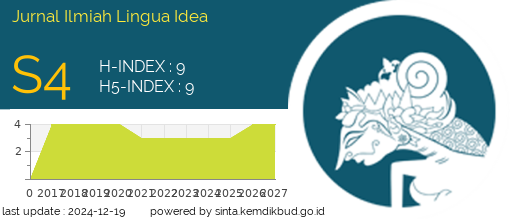In Puppet Master’s Hand: Discursive Manipulation Strategies in Socio-semiotic Perspective
Abstract
Love has a huge impact on someone's life. To be in love, someone tries to find a romantic relationship. Indeed, romantic love can be developed without having frequent or real-life interactions, such as with a stranger from a dating app. Telecom and internet fraud has become a public hazard as a new type of contactless crime, with crooks targeting large numbers of unsuspecting victims. This paper linguistically investigates the main character of the Tinder Swindler documentary film. Simon, the main character discursive strategies designed to manipulate girls' minds into accepting, even doing anything that he says to get profit to fulfill his luxurious lifestyle. Regardless of the scientific and technological tools utilized by swindlers, language is the primary communication. From a socio-semiotic standpoint, this research shows that criminal suspects use discourse resources to fabricate false information and construct false identities through discursive practice, to gain victims' trust, trick, deceive, and manipulate them into giving out confidential information and funds. This study investigates the dynamic process of selecting and building identities in the social-cultural context by altering associated discourse resources and techniques. This research also offers a socio-semiotic strategy for preventing online and telecom scams.
Keywords: discursive manipulation, film, identity, scam, socio-semiotic, dating application
References
Buchanan, T. (2012). warwick.ac.uk/lib-publications.
Chandler, D. (2002). SEMIOTICS THE BASICS. Bmj, 324(7337), 621. https://doi.org/10.1136/bmj.324.7337.621/a
Cheng, L., Ye, N., & Machin, D. (2020). Introduction: A sociosemiotic exploration of identity and discourse. Semiotica, 2020(236–237), 395–404. https://doi.org/10.1515/sem-2020-0030.
Clark, C. (1987). Sympathy Biography and Sympathy Margin. American Journal of Sociology, 93(2), 290–321. https://doi.org/10.1086/228746
Fischer, P., Lea, S. E. G., & Evans, K. M. (2013). Why do individuals respond to fraudulent scam communications and lose money? The psychological determinants of scam compliance. Journal of Applied Social Psychology, 43(10), 2060–2072. https://doi.org/10.1111/jasp.12158.
Gualberto, C., & Kress, G. (2019). Social Semiotics. The International Encyclopedia of Media Literacy, 1985, 1–9. https://doi.org/10.1002/9781118978238.ieml0226
Kopp, C., Layton, R., Sillitoe, J., & Gondal, I. (2016). The role of love stories in Romance Scams: A qualitative analysis of fraudulent profiles. International Journal of Cyber Criminology, 9(2), 205–216. https://doi.org/10.5281/zenodo.56227
Leeuwen, T. Van. (2005). Introducing Social Semiotics Theo van Leeuwen.
Salman, A., Saad, S., & Shahizan Ali, M. N. (2013). Dealing with ethical issues among internet users: Do we need legal enforcement? Asian Social Science, 9(8), 3–8. https://doi.org/10.5539/ass.v9n8p3
Sumter, S. R., Vandenbosch, L., & Ligtenberg, L. (2017). Love me Tinder: Untangling emerging adults’ motivations for using the dating application Tinder. Telematics and Informatics, 34(1), 67–78. https://doi.org/10.1016/j.tele.2016.04.009
Van Dijk, T. A. (2006). Discourse and manipulation. Discourse and Society, 17(3), 359–383. https://doi.org/10.1177/0957926506060250.
Whitty, M.T., Baker, A.J., Inman, J. A. (Eds. . (2007). The art of selling one’s self on an online dating site: the BAR Approach. Online Matchmaking. Palgrave Macmillan, 2000, 57–69.
Whitty, M. T. (2015). Online Dating. In International Encyclopedia of the Social & Behavioral Sciences: Second Edition (Second Edi, Vol. 17). Elsevier. https://doi.org/10.1016/B978-0-08-097086-8.95089-X
Whitty, M. T. (2021). Drug mule for love. Journal of Financial Crime, ahead-of-p(ahead-of-print). https://doi.org/10.1108/JFC-11-2019-0149

This work is licensed under a Creative Commons Attribution-ShareAlike 4.0 International License.
Authors who publish with Jurnal Ilmiah Lingua Idea agree to the following terms:
- Authors retain copyright and grant the journal right of first publication with the work simultaneously licensed under a Creative Commons Attribution License (CC BY-SA 4.0) that allows others to share the work with an acknowledgment of the work's authorship and initial publication in this journal.
- Authors are able to enter into separate, additional contractual arrangements for the non-exclusive distribution of the journal's published version of the work (e.g., post it to an institutional repository or publish it in a book), with an acknowledgment of its initial publication in this journal.
- Authors are permitted and encouraged to post their work online (e.g., in institutional repositories or on their website) prior to and during the submission process, as it can lead to productive exchanges, as well as earlier and greater citation of published work.





















.png)




_.png)


